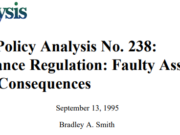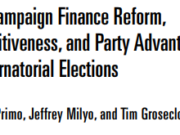In this article, Melanie D. Reed analyzes a legislative trend in which states are increasingly enacting broad contribution restrictions on state contractors, known as “pay-to-play” laws, in response to corruption allegations against elected officials. Reed asserts that these laws may actually go overboard, restricting individuals’ constitutionally protected First Amendment right to participate in the political system. Her article challenges the perception that broad restrictions will accomplish their intended goal of reducing corruption in the bidding process on government contracts. She concludes by suggesting that, “states passing pay-to-play laws should tailor the reach of such laws to focus on those contributors and recipients closely related to state contracts.” According to Reed, it is important that legislation focus on increasing the competitiveness of the contract bidding process, which should result in increased public confidence in government.














